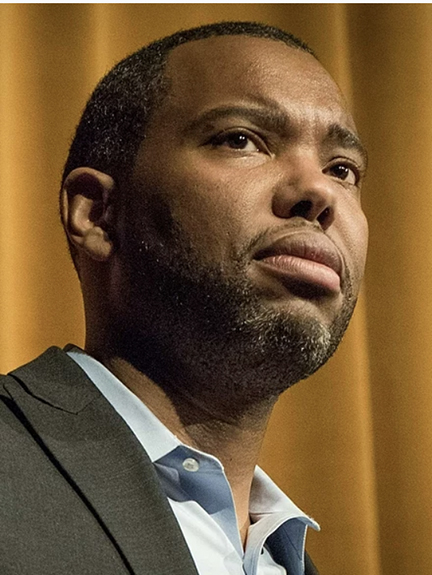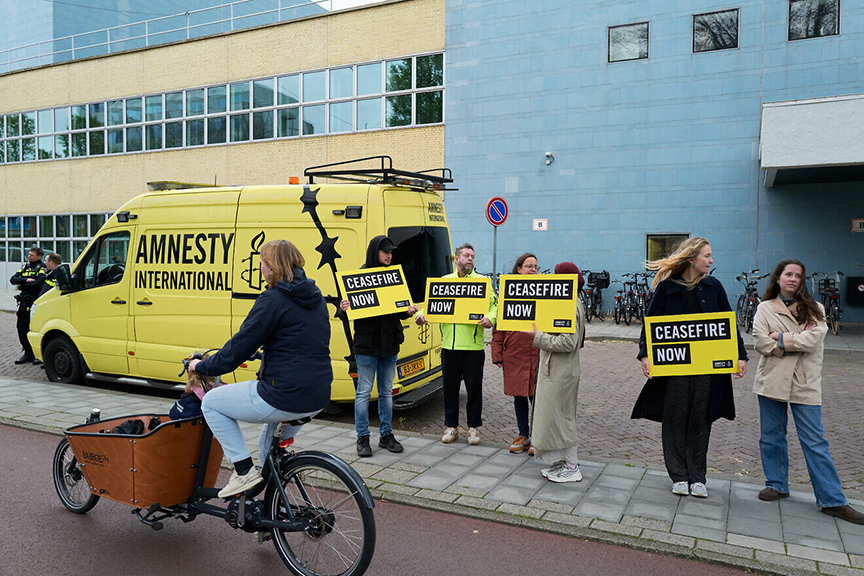New York magazine fawns over Ta-Nehisi Coates joining the anti-Israel bandwagon

by Karen Bekker
(CAMERA) — Three things stand out in Ryu Spaeth’s 7000-word, flattering profile of Ta-Nehisi Coates in New York magazine, promoting Coates’s new book: Coates’s apparent blindness to any facts that don’t support his anti-Israel premise, his desire for Jews to return to a state of powerlessness and vulnerability, and the pretense that Coates has done something brave and daring, without regard to whether it will hurt his career. (“The Return of Ta-Nehisi Coates,” September 23, 2024.)
Spaeth is writing about “The Message,” due out Oct. 1 – the day before the Jewish New Year, and just in time for the one-year commemoration of the worst massacre of Jews since the Holocaust. Unlike New York, CAMERA wasn’t given an advance copy, so we must take Spaeth’s descriptions of Coates and his work on faith. But even Spaeth ever-so-gently points out that Coates doesn’t have a firm grasp on the events surrounding Israel’s re-establishment in 1948, and that “there is no mention [in the book] of the fact that Israel is bombarded by terrorist groups set on the state’s annihilation. There is no discussion of the intifadas and the failed negotiations between Israeli and Palestinian leaders going back decades.” And yet, despite these very few critiques, the overall tone is somewhat fawning, filled as it is with quotes from Coates’s many admirers.
Spaeth writes of Coates, “the point he is trying to make is that anybody can see the moral injustice of the occupation. ‘What is the experience that justifies total rule over a group of people since 1967?’ he asked me. ‘My mother knows that’s wrong’.”
Why Coates has invoked his mother isn’t clear, but perhaps she doesn’t know that Israel got in to this situation as a result of a defensive war, or that Israel offered the Palestinians in the West Bank and Gaza their independence in 2000, or that former President Bill Clinton faults Palestinian Authority President Yasser Arafat for rejecting that offer. Or that the Palestinians again passed up independence in the West Bank in 2008, and again in 2014. Or that the walls and checkpoints that Coates laments are a response to terrorism, and that they have saved many lives. Perhaps she does not know, either, that Israel’s experiment with unilateral withdrawal in Gaza was proven to be a failure by 2007 when Hamas started throwing its political opposition off of rooftops, and that this failure was confirmed with absolute certainty on October 7 of 2023.
A better question is, does Coates know these things? Does he choose to ignore them? Israel cannot get out of the West Bank by agreement, and cannot get out unilaterally, but Coates issues his moral condemnation freely, without regard to the facts.
Indeed, his disregard for facts is so blatant that he is able to squeeze three falsehoods into one sentence. Coates tells Spaeth in their interview: “Should it turn out that we have our first Black woman president, and our first South Asian president, and we continue to export 2,000-pound bombs to perpetrate a genocide, in defense of a state that is practicing apartheid, I won’t be able to just sit here and shake my head and say, ‘Well, that is unfortunate’.” Of course, there is no apartheid, and no genocide, only a war that was started by Hamas. And in fact, there already is an embargo on the 2,000-pound bomb. But this disregard was probably inevitable, as, upon his return from his trip to the West Bank, Coates sought out Rashid Khalidi, the Columbia professor who holds a chair named after Edward Said, to continue his “education.”
Coates’s disdain for facts is on display when speaking about his former employer, The Atlantic. Coates makes the bizarre accusation that the magazine “elevat[es] factual complexity over self-evident morality.” Never mind that this is precisely what a news-oriented magazine is supposed to do. But not only do both Coates and Spaeth promote the demonstrably false claim that The Atlantic has a pro-Israel bias, they then make the positively laughable claim that the New York Times does as well:
“It’s not like Arthur Sulzberger is rubbing his hands together” and dictating pro-Israeli coverage, Coates continued, noting that the Times had recently published a mammoth investigation into how Jewish extremists had taken over the Israeli state. It’s that in the total coverage, in all of the talk of experts and the sound bites of politicians and the dispatches of credentialed reporters, a sense of ambiguity is allowed to prevail. “The fact of the matter is,” he said, “that kid up at Columbia, whatever dumb s*** they’re saying, whatever slogan I would not say that they would use, they are more morally correct than some mother****ers that have won Pulitzer Prizes and National Magazine Awards and are the most decorated and powerful journalists.”
Like others who promote the dissolution of the one Jewish state, Coates feigns concern over the Holocaust:
His affinity for conquered peoples very much extends to the Jews, and he begins the book’s essay on Palestine at Yad Vashem, Israel’s memorial to the victims of the Holocaust. “In a place like this,” he writes, “your mind expands as the dark end of your imagination blooms, and you wonder if human depravity has any bottom at all, and if it does not, what hope is there for any of us?”
And yet, he is also able to say, “‘Does industrialized genocide entitle one to a state? No.’ Especially, he said, at the expense of people who had no hand in the genocide.”
The statement is shocking as much for its ignorance as for its callousness. The League of Nations Mandate “in favor of the establishment in Palestine of a national home for the Jewish people” was created in 1922, two decades before the Holocaust. Moreover, about half of Israel’s Jewish population is descended from those who, after centuries of second-class status, fled or were expelled from other Middle Eastern countries. Nor did the state of Israel need to have come at the expense of anyone, if the Palestinian Arabs had accepted the 1947 Partition Plan.
More to the point, while it is not the Holocaust that entitles the Jews to a state, it was the Holocaust that opened many people’s eyes to the existential necessity of one.
But not Coates. To the contrary, Coates, at least according to Spaeth’s telling, wants Jews returned to the statelessness and powerlessness that were the predicate conditions for the Holocaust to occur. After the above description of Yad Vashem, Spaeth writes, “but what Coates is concerned with foremost is what happened when Jewish people went from being the conquered to the conquerors, when ‘the Jewish people had taken its place among The Strong,’ and he believes Yad Vashem itself has been used as a tool for justifying the occupation.” And later in the essay, he reiterates, “in [Coates’] hands, the story of Israel is a cautionary tale of the corrupting influence of power, a warning to the oppressed who might dream of one day exerting their will over an otherwise unkind world.”
And while many saw the events of October 7, 2023, as proof of what Hamas, Hezbollah, Palestinian Islamic Jihad, and other jihadist groups would like to do to Jews without the protection of the state of Israel, Coates excuses the attack, first writing on October 14 that “on Saturday, after sixteen years of siege, Hamas militants broke out of Gaza,” then again in his interview with Spaeth:
“If this was the 1830s and I was enslaved and Nat Turner’s rebellion had happened,” Coates told me that day in Gramercy, “I would’ve been one of those people that would’ve been like, ‘I’m not cool with this.’ But Nat Turner happens in a context. So the other part of me is like, What would I do if I had grown up in Gaza, under the blockade and in an open-air prison, and I had a little sister who had leukemia and needed treatment but couldn’t get it because my dad or my mom couldn’t get the right pass out? You know what I mean? What would I do if my brother had been shot for getting too close to the barrier? What would I do if my uncle had been shot because he’s a fisherman and he went too far out? And if that wall went down and I came through that wall, who would I be? Can I say I’d be the person that says, ‘Hey, guys, hold up. We shouldn’t be doing this’? Would that have been me?”
New York doesn’t seem to take issue with this sentiment. Rather, Spaeth seems to agree with it, writing that The Message gives “a picture of the intolerable cruelty and utter desperation that could lead to an October 7.”
How did this all come about? Coates apparently took a 10-day trip to the region, in 2023, just a couple of months before the October 7 attack. (New York does not tell us who ran the trip, but it appears to have been Palestine Festival of Literature.) Did Coates have the opportunity, or the will, to learn the other side of the story? It would appear not, as he came away from the trip with the false belief that there are “tiers of citizenship between the first-class Jews and the second-class Palestinians” (Israeli Arabs have full, equal citizenship and Palestinian Arabs are not Israeli citizens at all but under the jurisdiction of the Palestinian Authority); that “rule by the ballot for some and the bullet for others was policy” (Palestinians, of course, exercise their franchise with the PA, when that body allows it), and that Palestinians are being “pushed out” of their homes (only in cases in which they would under any country’s laws, such as for non-payment of rent, non-ownership, etc.).
The conceit of the article, however, is that writing all of this about Israel is brave and risky for Coates, with the always-insightful Peter Beinart declaring that, “Ta-Nehisi has a lot to lose.” Spaeth writes, “what matters to Coates is not what will happen to his career now – to the script sales, invitations from the White House, his relationships with his former colleagues at The Atlantic and elsewhere. ‘I’m not worried,’ he told me, shrugging his shoulders. ‘I have to do what I have to do. I’m sad, but I was so enraged. If I went over there and saw what I saw and didn’t write it, I am f***ing worthless’.”
But a close read of the New York article reveals that in fact it’s opposite. Spaeth has, perhaps inadvertently, shown how Coates’s career has faltered, or at least not taken him where he had planned. We learn that “in the years after ‘The Case for Reparations’ was published, Coates was initiated into elite rooms in New York, Washington, and Hollywood. He testified before Congress, won a National Book Award, was interviewed by Oprah. This son of West Baltimore found himself, by his early 40s, an esteemed member of the powerful whose message was welcomed.” But Coates’s claim that he “hated” being “too famous” doesn’t ring true in light of his next step – an unlikely foray into Hollywood. This, however, appears to have been unsuccessful:
He struck notes of regret when discussing various movie scripts he has in development that have yet to see the light of day, including a Superman reboot… His novel, The Water Dancer, was a success both critically and commercially, but its reception felt quiet in comparison to that of “Between the World and Me,” which in addition to transforming him into a hero of the liberal left made him a talisman of hate on the right.
In certain circles, Israel is today’s most fashionable bogeyman, and taking rhetorical aim at the Jewish state while it is under physical attack from multiple directions, is likelier than unmade movie scripts to bring Coates more of the accolades and attention to which he seems to have become accustomed – certainly more than the chapter of the book on Senegal will. (Just look at how much of Spaeth’s essay discusses Senegal.) What a stroke of luck, then, for Coates, that he took this trip in the summer of 2023. Rather than taking a risk that “The Message” will tank his career, Coates seems to be hoping the book will revitalize it. With his essay on Israel, Spaeth writes, “Coates aims for the sort of paradigm shift that first earned him renown….” Oh, really.
As for New York, it seems to have interpreted its task as producing a glowing profile of Coates without checking some of his most incendiary claims, such as that water is “sequestered for Israeli use,” (the Palestinian Authority is responsible to provide water to Palestinians under its jurisdiction) or that a soldier stopped Coates “on the street to ask him his religion,” with the “correct answer” being “anything but ‘Muslim’,” (CAMERA is not aware of such things happening regularly, other than to gain access to certain Muslim holy sites, in which case “Muslim” is in fact the correct answer, or possibly on a single street in Hebron). A photo caption right at the top repeats, unchallenged, highly dubious claims about a “massacre” in Lydda in 1948, “where, among other things, grenades were tossed into a mosque.” (Was the specific claim about the grenade an attempt to excuse the fact that Hamas terrorists, on October 7, threw grenades into places where civilians were sheltering?)
As for the hypothetical little sister with leukemia mentioned above, in 2022, Israel issued 17,000 permits for people from Gaza to enter Israel for medical treatment. Prior to October 7, 2023, many were driven to their appointments, on a volunteer basis, by the same people who suffered or were killed in that day’s attack.
As noted above, the book is not yet out, and CAMERA wasn’t given an advance copy. But from New York’s account, it seems that Coates is trying to put the Israeli-Arab conflict into the same boxes that he uses for American race relations. Spaeth writes, “for Coates, the parallels with the Jim Crow South were obvious and immediate.” But in the Middle East, it was Jews and Christians who lived as second-class citizens, known as dhimmis, similar to Blacks in the Jim Crow South, for centuries. Subject to violence and eventually expelled, Middle Eastern Jews found refuge in Israel, alongside those from Europe. But Coates inverts oppressor and oppressed, and confuses self-defense with aggression. Such attempts can appeal only to the most uninformed of readers. Time will tell whether there are enough of them to make Coates’s book the success he is looking for.
Karen Bekker is the Assistant Director of CAMERA’s Media Response Team. Prior to joining CAMERA, she practiced law for nine years as a commercial litigator.



